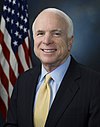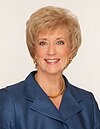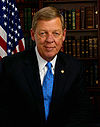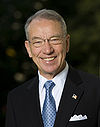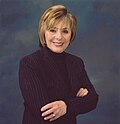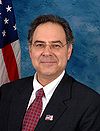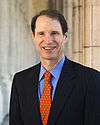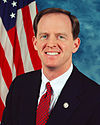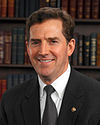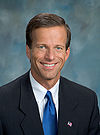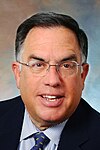Election to the United States Senate in 2010
The 2010 United States Senate election took place on Tuesday, November 2, 2010. 37 of the 100 seats in the Senate stood for election . With 51 seats out of 100, the Democrats almost won the majority. The Republicans won six seats.
A special election for a 38th seat took place on January 19, 2010 in Massachusetts : The Republican Scott Brown defeated the Democrat Martha Coakley with 52% to 47% and thus succeeded the late Senator Edward Kennedy (D).
34 of the seats to be allocated had regular six-year terms of office (January 3, 2011 to January 2017). The other 3 were special elections and had shorter terms in office: Delaware (until January 2015), New York (until January 2013) and West Virginia (until January 2013).
Of the seats available for election, 19 were held by Democrats and 18 by Republicans. Six incumbents in both parties had announced that they would not run again. One Democratic and two Republican incumbents could not hold their own in the party primaries.
Following the 2008 Senate election , Senator Arlen Specter's move from Republican to Democratic Party, and the Massachusetts special election, the pre-election Senate was composed of 57 Democrats, 41 Republicans and 2 Independents (who vote with the Democrats).
Specifics of choice
Democratic Senators who did not run again (6 seats)
- Chris Dodd - ( Connecticut )
- Ted Kaufman - ( Delaware )
- Roland Burris - ( Illinois )
- Evan Bayh - ( Indiana )
- Byron Dorgan - ( North Dakota )
- Carte Goodwin - ( West Virginia )
Republican Senators who did not run again (6 seats)
- George LeMieux - ( Florida )
- Sam Brownback - ( Kansas )
- Jim Bunning - ( Kentucky )
- Kit Bond - ( Missouri )
- Judd Gregg - ( New Hampshire )
- George Voinovich - ( Ohio )
Democratic Senators who were voted out in the primary elections (1 seat)
- Arlen Specter - ( Pennsylvania )
Republican Senators who were voted out in the primary election (2 seats)
- Lisa Murkowski - ( Alaska ) - Murkowski then applied unofficially as a so-called "Write-in" candidate ( see below )
- Bob Bennett - ( Utah )
Democratic incumbent (12 seats)
- Blanche Lincoln - ( Arkansas )
- Barbara Boxer - ( California )
- Michael Bennet - ( Colorado )
- Daniel Inouye - ( Hawaii )
- Barbara Mikulski - ( Maryland )
- Harry Reid - ( Nevada )
- Kirsten Gillibrand - ( New York )
- Charles Schumer - ( New York )
- Ron Wyden - ( Oregon )
- Patrick Leahy - ( Vermont )
- Patty Murray - ( Washington )
- Russ Feingold - ( Wisconsin )
Republican Incumbents (10 seats)
- Richard Shelby - ( Alabama )
- John McCain - ( Arizona )
- Johnny Isakson - ( Georgia )
- Mike Crapo - ( Idaho )
- Chuck Grassley - ( Iowa )
- David Vitter - ( Louisiana )
- Richard Burr - ( North Carolina )
- Tom Coburn - ( Oklahoma )
- Jim DeMint - ( South Carolina )
- John Thune - ( South Dakota )
The states at a glance
Alabama
Republican incumbent Richard Shelby competed against lawyer and Democrat William G. Barnes, who defeated teacher Simone De Moore with 60.8 percent of the vote in the primary. Shelby won with 84.4 percent against Clint Moser, who was supported by the Tea Party movement . Alabama is considered a very conservative state; Shelby was about 30 percentage points ahead of Barnes in polls. Shelby won the election with 65.3% of the vote, Barnes got 34.7%.
Alaska
The incumbent Republican Senator Lisa Murkowski wanted to run again. It was speculated that the former Alaska governor and 2008 vice presidential candidate Sarah Palin Murkowski would challenge her within the party.
Palin finally announced not to run against the Senator, but she supported Murkowski's opponent Joe Miller in the Republican primary. Murkowski was initially considered the favorite, both in the primaries and in the actual election in November. Joe Miller won the primaries on August 24th relatively narrowly.
With Scott McAdams , Frank Vondersaar and Jacob Seth Kern, the democratic field comprised three rather unknown candidates. McAdams, Mayor of Sitka , won the primaries. It has been speculated at times that the Democrats might replace him with the more well-known former Alaska Governor Tony Knowles for better odds against Miller. However, the party ultimately pledged its support to McAdams.
In the meantime, Lisa Murkowski had signaled that she was fighting to stay in the Senate as a so-called write-in candidate. With this method it would be possible that it would not be on the ballot paper, but that it could be entered there by the voters. Polls saw Miller roughly on par with Murkowski, while McAdams was about 10% behind the two Conservatives. Due to the fact that Murkowski's name was not on the ballot, however, experts doubted the seriousness of these surveys and therefore considered a strongly different result to be possible.
Lisa Murkowski won the election as a write-in candidate with 39.5 percent of the vote. Joe Miller got 35.5 percent, Scott McAdams 23.5 percent.
Arizona
John McCain, the Republican incumbent and 2008 presidential candidate , ran again. He had to face a challenge from former Congressman JD Hayworth in the Republican primary on August 24, but ultimately prevailed safely. Four candidates have run for the primary election for the Democrats: the Vice Mayor of Tucson , Rodney Glassman , the former MP in the Arizona Parliament, Cathy Eden, the civil rights activist Randy Parraz and the journalist John Dougherty. Glassman clearly won the primary. David Nolan , the founder of the Libertarian Party, competed . According to polls, McCain was about 20% ahead of the Democrats.
McCain won the election with 59.3% of the vote, Glassman got 34.6%. Nolan accounted for 4.7%, the green Jerry Joslyn got 1.4%.
Arkansas
Democratic incumbent Blanche Lincoln ran for another term. In the primary she was able to prevail with 52% against the representative of the party left, Lieutenant Governor Bill Halter. Congressman John Boozman clearly won the Republican primary . Boozman was considered the favorite for the November main election. He was about 25 percentage points ahead of Lincoln in polls. The main reason for this was Lincoln's Senate approval of President Barack Obama's health care reform Obama Care , which, according to polls, was clearly rejected in Arkansas. In addition, Arkansas has developed from a reliable democratic state at all levels to a swing state over the past two decades . While Bill Clinton still clearly won Arkansas - his home state - in the presidential elections in 1992 and 1996 , the approval of the Democratic candidates continued to decline. Obama received 38.86% of the vote in 2008 .
Incumbent Lincoln received 36.9% of the vote, Boozman 58%. The independent Trevor Drown received 3.3% and John Gray of the Greens 1.9%.
Colorado
Michael Bennet , the incumbent Democratic Senator, was named in January 2009 by Governor Bill Ritter to succeed Ken Salazar , who had been appointed Secretary of the Interior by President Obama. In the Democratic primary, Bennet faced a tough challenge from Andrew Romanoff, former Speaker of the Colorado House of Representatives . While Bennet was supported by President Obama, Romanoff could count on the support ( endorsement ) of Bill Clinton . Ultimately, Bennet decided the area code surprisingly clearly for himself with 54.5 percent of the vote. On the Republican candidates excretion ran scarce, with the District Attorney of Weld County , Ken Buck , interspersed with 51.6 percent of the vote against the former Deputy Governor Jane E. Norton. Colorado was considered a swing state, as the latest polls for the main election in November showed: the Democratic and Republican candidates were neck and neck.
Bennet won the election with 47.7% of the vote, Buck got 46.8%.
Connecticut
Senator Chris Dodd of the Democrats announced in January 2010 that he was not standing again. The Democratic Attorney General of Connecticut, Richard Blumenthal, ran for his successor . The Republican field included businesswoman Linda McMahon , former Congressman Rob Simmons, and financial analyst Peter Schiff. In polls for the Republican nomination, McMahon was well ahead of Simmons and Schiff and won them on August 10th. However, she had a hard fight against the Democrat Blumenthal. Blumenthal was about 10% ahead of McMahon in polls. Connecticut was considered a strongly democratic state, Barack Obama got about 61% of the vote in 2008.
Blumenthal won the election with 55.1 percent of the vote, McMahon received 43.3 percent.
Delaware (special election)
Democratic Senator Ted Kaufman was established in January 2010 by the then Governor Ruth Ann Minner to succeed the vice president elected Joe Biden appointed. Biden was re-elected in the 2008 Senate election , but had to step down to become Vice President. A special election was therefore necessary to determine Biden's successor by 2015. Kaufman announced not to run there. The head of New Castle County , Chris Coons, applied for the Democrats . Congressman and former Governor Michael Castle has long been a clear favorite for the Republican primary over political commentator Christine O'Donnell , who was a Senate candidate in 2008. Ultimately, however, this won the area code completely surprisingly with 53.1 percent of the votes, which indicated a turnaround in the polls. If Castle had clearly better chances compared to Coons, this did not apply to the much more conservative O'Donnell, who was also financially supported by the Tea Party movement. The choice has now been classified as completely open.
Chris Coons won the election with 56.6 percent of the vote, O'Donnel won 40 percent.
Florida
Acting Republican Senator George LeMieux was named in August 2009 by Governor Charlie Crist to succeed Mel Martínez , who had previously resigned.
After LeMieux announced that he would not run again, Governor Crist announced that he would run for the Senate himself.
Crist quickly lost support within party circles, largely because of his support for Barack Obama's American Recovery and Reinvestment Act . Then Crist resigned from the Republican Party and entered the race as an independent.
For the Republicans, the former Speaker of the Florida House of Representatives , Marco Rubio , took over.
In the Democratic primaries, Congressman Kendrick Meek clearly prevailed against businessman Jeff Greene.
Surveys show that Crist and Rubio were neck and neck; the Democrat Meek lagged well behind, as the moderate Crist could count on many democratic votes. Recently, however, Rubio's lead grew.
In the election Rubio achieved the election victory with 48.9 percent. Christ got 29.7 percent, Meek 20.1 percent.
Georgia
Johnny Isakson, the Republican incumbent, ran again after he was not challenged in primary. He met Democrat Mike Thurmond , currently the Commissioner of Labor in the Georgia state government.
According to polls, 60 percent of voters were satisfied with Isakson's leadership as a senator, so he was around 20 percentage points ahead of Thurmond. The candidate of the Libertarian Party Chuck Donovan could hope for six to seven percent.
Isakson won the election with 58.1 percent. Thurmond achieved 39.2 percent, Donovan with 2.7 percent significantly less than predicted in surveys.
Hawaii
The Democrat Daniel Inouye, senior senator and pro tempore president , has run for another term. Hawaii was considered a democratic stronghold, and in 2008 President Obama received more than 70 percent of the vote. In addition, Hawaii last elected a Republican to the Senate in 1970.
Inouye won the election with 74.8 percent very clearly ahead of his Republican opponent Campbell Cavasso (21.6 percent)
Idaho
Mike Crapo, incumbent Republican Senator, competed against Democrat Tom Sullivan . He won the primaries clearly with a share of 79.3 percent against Skip Davis. The politically inexperienced businessman Sullivan also clearly defeated William Bryk. Idaho was considered to be strongly Republican.
Crapo won the election with 71.1 percent of the vote, Sullivan won 25 percent.
Illinois
After Barack Obama was elected president, Democrat Roland Burris was named a senator by former governor Rod Blagojevich . However, Burris did not run for a full term. The Democratic State Treasurer Alexi Giannoulias , the Republican Congressman Mark Kirk and the candidate of the Greens , LeAlan Jones, ran for his successor. Polls saw a close race between Giannoulias and Kirk, with the last forecast nine percentage points likely to be decisive for Jones.
On November 2, in addition to the regular Senate election, a special election was held for a term after the election until January 2011. The election became necessary because an Illinois court ruled that voters should vote on who will succeed Barack Obama as senator. The same candidates ran for this special election as for the regular election.
Kirk won the double election with 48.2 percent, just ahead of Giannoulias, who got 46.3 percent.
Indiana
Democratic Senator Evan Bayh announced in February 2010 that he would not run again. He did this one day after the deadline, after which 500 supporters' signatures for a candidacy should have been submitted, which consequently no applicant could succeed. The Executive Committee of the Indian Democratic Party decided on the nomination and on May 15, 2010 selected Congressman Brad Ellsworth .
For the Republicans, former Senator Dan Coats ran . He entered the election campaign relatively late and then left John Hostettler, who had been in the lead up to that point, behind. Hostettler had lost his congressional mandate to Democrat Ellsworth in 2006. According to surveys, Coats was about 20 percentage points ahead of Ellsworth.
In the election, Coats achieved a clear victory with 56.4 percent. Ellsworth got 38.1 percent of the vote.
Iowa
Republican incumbent Chuck Grassley is running again, facing Democrat Roxanne Conlin , a former federal attorney . Grassley won the primary without an opponent, Conlin won the Democratic with 77.5 percent of the vote. While Iowa is considered a swing state, Grassley's work as a senator has been viewed positively by more than 60 percent of Iowa's voters. Therefore, Conlin was well behind Grassley in polls.
Grassley won with 64.5 percent of the vote, Conlin got 33.2 percent.
California
The incumbent Democratic Senator Barbara Boxer competed against the Republican and former head of HP , Carly Fiorina . Fiorina won the June 8th Republican primary, with approximately 56 percent of the vote, clearing her contestant Tom Campbell, a former congressman, and Chuck DeVore, a member of the California State Assembly . The polls for the main election indicated a close result of the race; recently Boxer was just ahead.
Other applicants were Gail Lightfoot (Libertarian Party), Duane Roberts (Green Party) and Marsha Feinland, former presidential candidate of the feminist-socialist Peace and Freedom Party .
Boxer won the election more clearly than expected in the polls with 52.1 percent of the vote, almost 10 percentage points more than Fiorina (42.5 percent); the other candidates remained meaningless.
Kansas
Sam Brownback, the Republican senator, had announced that he was running for governor of Kansas. For the Republicans, Congressman Jerry Moran came up, who narrowly beat Todd Tiahrt , another member of the House of Representatives , in the primary . The Democrat Lisa Johnston, director of Baker University , prevailed in the party primaries, but according to surveys she was about 40 percentage points behind the Republican Moran.
Moran finally won with 70.3 percent of the vote, Johnston received 26.2 percent.
Kentucky
Republican Senator Jim Bunning announced in July 2009 that he would not run again. In the May 18 Republican primary, ophthalmologist Rand Paul beat Kentucky Secretary of State Trey Grayson. Paul is the son of Congressman and former presidential candidate Ron Paul and was considered a representative of the conservative tea party movement . The Attorney General of Kentucky, Jack Conway , won the Democratic primary election relatively narrowly against Lieutenant Governor Daniel Mongiardo. In polls for the main election, Paul was slightly ahead of Conway.
Paul won the election with 55.8 percent, Conway won 44.2 percent.
Louisiana
Democratic Congressman Charlie Melancon competed against incumbent Republican Senator David Vitter . Vitter's renewed candidacy was undisputed in his party. He won the primary with 87.6 percent of the vote in front of Chet D. Traylor, a former Louisiana Supreme Court Justice, who got 7.0 percent. There was also no serious competition among the Democrats for Melancon, currently the only Democratic congressman from Louisiana. He received 70.6 percent of the vote, the second-placed Neeson Chauvin 17.7 percent.
In recent polls, Vitter was around 20 percentage points ahead of Melancon. The Libertarian Party is also putting up a candidate with Randall Todd Hayes.
Vitter won the election with 56.6 percent, Melancon came with 37.7 percent.
Maryland
Barbara Mikulski, the current democratic incumbent, ran for a fifth term. Maryland is considered to be a predominantly democratic state, Barack Obama came to about 62% in 2008. According to surveys, Mikulski's work as a senator was rated positively by the majority of voters, which made her the favorite for the main election after she easily won the Democratic Primary with 81.7 percent of the vote. The Republicans had a field of eleven mostly unknown candidates, in which Eric Wargotz and Jim Rutledge ultimately made the victory among themselves. Wargotz, Commissioner of Queen Anne's County , dismissed Rutledge with 38 percent of the vote, who received 31 percent.
Mikulski won the election with 61.8 percent of the vote, Wargotz received 36.3 percent.
Missouri
His party colleague Roy Blunt , a congressman since 1997 and father of former governor Matt Blunt , applied for the successor to the Republican who did not run again after four terms in office . For the Democrats, the Secretary of State of Missouri, Robin Carnahan , daughter of former Senator Jean Carnahan, ran . She won the primary of her party with 83.9 percent of the vote ahead of Richard Tolbert (10.6 percent). Among the Republicans, Blunt prevailed against eight less well-known candidates and got 70.9 percent. According to surveys, Blunt has been able to make up his deficit on Carnahan in recent months and was recently around ten percentage points ahead.
The Constitution Party with Jerry Beck and the Libertarian Party with Jonathan Dine were represented on the ballot paper as smaller parties .
In the end, Blunt clearly won the election with 54.3 percent of the vote, Carnahan received 40.6 percent of the vote.
Nevada
Harry Reid, in the Senate since 1987, ran for a fifth term. The Democratic majority leader ran against Republican Sharron Angle , a former member of the Nevada Assembly and a representative of the Tea Party movement. Angle was able to prevail in the primaries with 40.1 percent of the vote against their competitors Sue Lowden (26.1 percent) and Danny Tarkanian (23.3 percent); Reid scored 75.3 percent as the winner of the Democratic Primary. Reid was able to clearly win the last election, but according to recent polls this was no longer the case for this election: he was only a few percentage points ahead of Angle. Experts believed that Angle could win as it led among the deciding independent voters.
Reid won the election more clearly than expected with 50.2 percent of the vote, Angle won 44.6 percent.
New Hampshire
After Republican Judd Gregg announced that he would not run again, the traditionally strong Democrats in New England hoped to win this seat, for which Congressman Paul Hodes competed. However, in polls, he was consistently well behind the Republican candidate, Kelly Ayotte . The former attorney general of New Hampshire, as the clear favorite, ultimately had to fear for her party's nomination, which she won with 38.1 percent of the vote, only slightly ahead of Ovide Lamontagne (37.2 percent). Hodes, a member of the House of Representatives since 2007, did not face any rival among the Democrats.
Ayotte won the election with 60.2 percent of the vote, Hodes received 36.7 percent.
new York
The Democratic incumbent and former chairman of the Democratic Senatorial Campaign Committee (DSCC), Charles Schumer, ran for a third term. Due to his high approval ratings, Schumer, who has been in office since 1999 and, as deputy chairman of the Democratic Caucus, was the third-highest rank of the party hierarchy in the Senate after Harry Reid and Richard Durbin , was the clear favorite against the Republican candidate Jay Townsend . Townsend prevailed in his party's primary with 56.1 percent of the vote against Gary Berntsen. Surveys saw Schumer in the lead by 20 to 30 percentage points. In the event that Majority Leader Reid had lost his seat in Nevada, but the Democrats had retained the majority in the Senate, Schumer was considered to be his likely successor.
Schumer won with 65.4 percent of the vote, Townsend got 33.0 percent.
New York (special option)
After the former Democratic Senator and presidential candidate Hillary Clinton moved to the State Department, Governor David Paterson named Democratic Congressman Kirsten Gillibrand to succeed Clinton in January 2009 . Since Hillary Clinton's term of office lasted until early 2013, a special election on November 2, 2010 was necessary to fill the remainder of the term. Gillibrand, whose appeal was generally taken by surprise by Paterson, initially appeared to be facing a difficult primary campaign, as Carolyn B. Maloney and Carolyn McCarthy, two congressmen who were considered to be more liberal, were considering an opposing candidate. Another member of Congress, Steve Israel, showed interest, but President Barack Obama personally persuaded him to refrain from a potentially problematic primary election. Since Maloney and McCarthy also ultimately renounced a candidacy, the primary for Gillibrand ultimately went without a hurdle; with 75.9 percent of the vote, she defeated the lawyer Gail Goode.
There was long speculation among the Republicans about well-known candidates. The circle included former Governor George Pataki , former New York Mayor Rudolph Giuliani and Congressman Peter T. King . Ultimately, all of them decided not to apply, leaving a less prominent field from which the primary Joseph J. DioGuardi emerged as the winner. The former congressman (1985 to 1989), father of music producer Kara DioGuardi , relegated economist David Malpass (37.6 percent) and local politician Bruce Blakeman (20.7 percent) to second and third place with 41.7 percent of the vote .
Senator Gillibrand, who is also supported by the Working Families Party , was about 20 percentage points ahead of DioGuardi, who was also on the ballot paper as a candidate for the Conservative Party . As is customary in New York, there were a number of other candidates from smaller parties, including David Malpass, who had failed with the Republicans and was now running for the Taxpayers Party .
As expected, Gillibrand clearly won the election with 62 percent, DioGuardi achieved 35.8 percent.
North Carolina
The Republican Richard Burr, who was elected to the Senate in 2004 against Erskine Bowles, wanted to break a series: Since 1968, no incumbent of the class 3 seat from North Carolina has been re-elected. However, polls clearly see him ahead of Democrat Elaine Marshall , currently Secretary of State in the state government. One factor, however, could be the candidacy of Michael Beitler from the Libertarian Party, who is forecast to receive up to ten percent of the vote.
Burr won the election with 55.0 percent. Marshall got 42.9 percent, Beitler 2.1 percent.
North Dakota
Acting Democratic Senator Byron Dorgan announced in January 2010 that he would not run again. As a result, the respected governor of North Dakota, John Hoeven , decided to run for the Republicans. For the Democrats, the State Senator Tracy Potter went into the race. Both candidates remained unrivaled in their party's primaries. North Dakota was seen as the Republicans' surest pick-up in these Senate elections. Hoeven was more than 40 percentage points ahead of Potter in polls. The third candidate was Keith Hanson of the Libertarian Party.
Hoeven won the election with 76.2 percent of the vote, Potter only 22.2 percent.
Ohio
To succeed the Republican Senator George Voinovich, who was not running again after two terms in office, his party colleague, Rob Portman , a former congressman and under George W. Bush as director of the Office of Management and Budget member of the federal cabinet, applied. The Democrats nominated incumbent Lieutenant Governor Lee Fisher . In the Democratic primary on May 4, Fisher clearly won against Secretary of State Jennifer Brunner. Although Ohio is considered a classic swing state, Republican Portman was about nine percentage points ahead of Democrat Fisher in polls. There were also several candidates from small parties, including the trade unionist Dan La Botz for the Socialist Party .
Portman won the election with 57.3 percent, Fisher got 39 percent.
Oklahoma
Republican Tom Coburn ran for a second term. He ran against Democrat Jim Rogers , a teacher who won his party's primary election with 65.4 percent of the vote against businessman Mark Myles. Oklahoma was considered a strongly republican state. In addition, about 70 percent of Oklahoma voters say they are happy with Coburn's work as a senator. Accordingly, this was more than 40 percentage points ahead of Rogers in surveys.
Coburn won the election with 70.5 percent, Rogers came with 26.1 percent.
Oregon
The Democrat Ron Wyden, in office since 1996, ran again. Jim Huffman , a professor at Lewis & Clark Law School, ran for the Republicans . Oregon was seen as a Democratic state, Barack Obama won the state in 2008 with around 57 percent of the vote. In addition, the majority of Oregon’s voters are satisfied with Wyden’s work as a senator. According to recent polls, Wyden was about 20 percentage points ahead of Huffman. The Libertarian Party nominated Marc Delphine, who has no chance of winning.
Wyden was re-elected with 57.2 percent of the vote. Huffman was 39.4 percent.
Pennsylvania
Senator Arlen Specter announced his move from Republicans to Democrats in April 2009 in order to have a better chance of re-election. In August 2009, Democratic Congressman Joe Sestak declared that he would challenge Specter within the party. Polls initially showed Specter to be clearly ahead of Sestak, but Sestak was able to increase its profile significantly during the pre-election campaign. Finally, on May 18, he was able to clearly defeat incumbent Specter with 54 percent of the vote. For the Republicans, former Congressman Pat Toomey ran . While the Democrats in Pennsylvania achieved significant gains in the last election, this trend recently appeared to be reversed: Toomey was about six to ten percentage points ahead of Sestak in polls.
The election result was tighter than predicted in the polls: Toomey won with 51.0 percent of the vote, Sestak won 49 percent.
South carolina
The Republican incumbent Jim DeMint competed against the Democrat and war veteran Alvin Greene , who surprisingly prevailed against Vic Rawl in the primary. Greene, an unemployed veteran with no campaign organization, was seen as having no chance against DeMint. The nomination of Greene, who is the first African American Senate candidate for one of the two big parties in South Carolina, caused some fierce arguments among the Democrats, as he is considered completely unknown within his party and later it turned out that he was facing a moral suit.
As expected, DeMint won significantly with 62.4 percent. Green only got 28.2 percent of the vote, the candidate of the Green Party, Tom Clements, achieved a respectable result with 9.4 percent.
South Dakota
Republican John Thune defeated Democratic incumbent Tom Daschle in 2004 with 51 percent of the vote. Thune, meanwhile a popular politician in his state, entered the main election in November without any opponents from the Democrats and won with 100 percent of the vote.
Utah
In the traditionally conservative state, two applicants met who had not yet held a political office. For the Republicans came the lawyer Mike Lee , who defeated businessman Tim Bridgewater in the primary. Before that, incumbent Bob Bennett was eliminated in third place in the pre-vote at the State Convention . At their party conference, the Democrats decided in favor of businessman Sam Granato , who, according to surveys, should have had no chance of victory.
Lee won the election with 61.6 percent, Granato achieved 32.8 percent. Scott Bradley of the Constitution Party got 5.7 percent.
Vermont
The Democrat Patrick Leahy, who has been in the Senate since 1975, ran for a seventh term after defeating the doctor Daniel Freilich, who is now running as an independent, without any problems in the primary elections. Leahy was well ahead of Republican businessman Len Britton in the polls .
Leahy won the election with 64.4 percent, Britton got 30.9 percent.
Washington
The Democratic Senator Patty Murray, in office since 1993, ran again. Republican Dino Rossi , a former state senator , clearly beat his challengers Clint Didier and Paul Akers in the primaries. Rossi, who ran against Christine Gregoire in the 2004 and 2008 gubernatorial elections but was defeated by the Democrat in both elections, according to surveys, had significantly better chances of winning against Senator Murray: Both candidates were about the same.
Murray won the election with 52.4 percent, Rossi achieved 47.6 percent.
West Virginia (special option)
After the death of longtime Democratic Senator Robert Byrd in June 2010, Governor Joe Manchin appointed Carte Goodwin as his successor. Goodwin did not run for re-election. Instead, Governor Manchin himself ran for the mandate after, as expected, clearly winning his party's primary elections. The Republican opponent was John Raese , who had not yet appeared politically . The third applicant was Jesse Johnson for the Greens ( Mountain Party ). The winner of the election was due to complete Byrd's original term by January 3, 2013. Polls saw Manchin and Raese roughly on par.
Manchin clearly won the election with 53.5 percent. Raese achieved 43.3 percent.
Wisconsin
The democratic incumbent Russ Feingold ran for a fourth term. It has been speculated with the fact that the former governor of Wisconsin , Tommy Thompson , could compete for the Republicans. However, he announced in April 2010 that he would not run for office. His Republican challenger was now businessman Ron Johnson . He decided the primary of his party with 84.7 percent of the vote, clearly ahead of David Westlake (10.4 percent). According to surveys, a head-to-head race between Feingold and Johnson was emerging.
Johnson won the election with 51.9 percent of the vote, Feingold received 47.0 percent.
Survey
Result
| Parties | Seats | be right | ||||||
|---|---|---|---|---|---|---|---|---|
| 2008 * | 2010 ** | +/- | Strength | be right | % | |||
| Democrats | 57 | 51 | −6 | 51% | 34.265.261 | 45.20% | ||
| republican | 41 | 47 | +6 | 47% | 37,248,589 | 49.14% | ||
| Other parties | 2 | 2 | ± 0 | 2% | 4,290,203 | 5.66% | ||
| total | 100 | 100 | 0 | 100% | 75,804,053 | 100% | ||
| Source: RealClearPolitics The Green Papers | ||||||||
* Seat distribution immediately prior to the 2010 Senate election (including the 2010 Massachusetts special election, Sen. Arlen Specter's (Pennsylvania) change of party, and replacements following the Obama administration's appointment)
** In the distribution of seats, Alaska Senator Lisa Murkowski is assigned to the Republican Party. She did not run as a candidate for the party, but belongs to the Republican faction in the Senate and is also officially listed as a Republican in the Senate.
Individual evidence
- ^ Result for Miller and McAdams: State of Alaska 2010: General Election Official Results. US Senator ; Result for Murkowski calculated according to State of Alaska 2010: General Election Official Results. United States Senator Write-In - Result for "Lisa Murkowski" and "Murkowski CC"
- ↑ [1]







